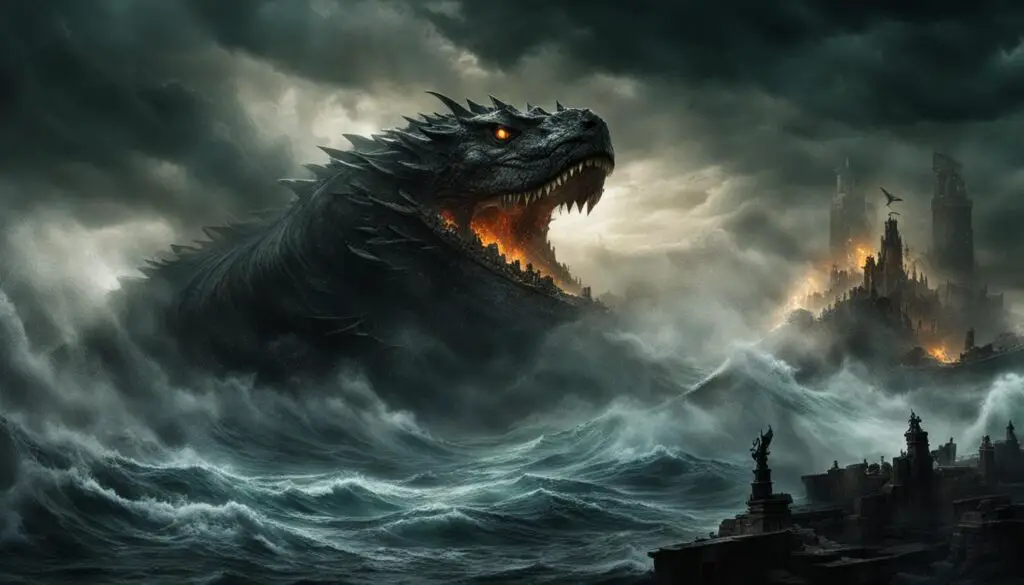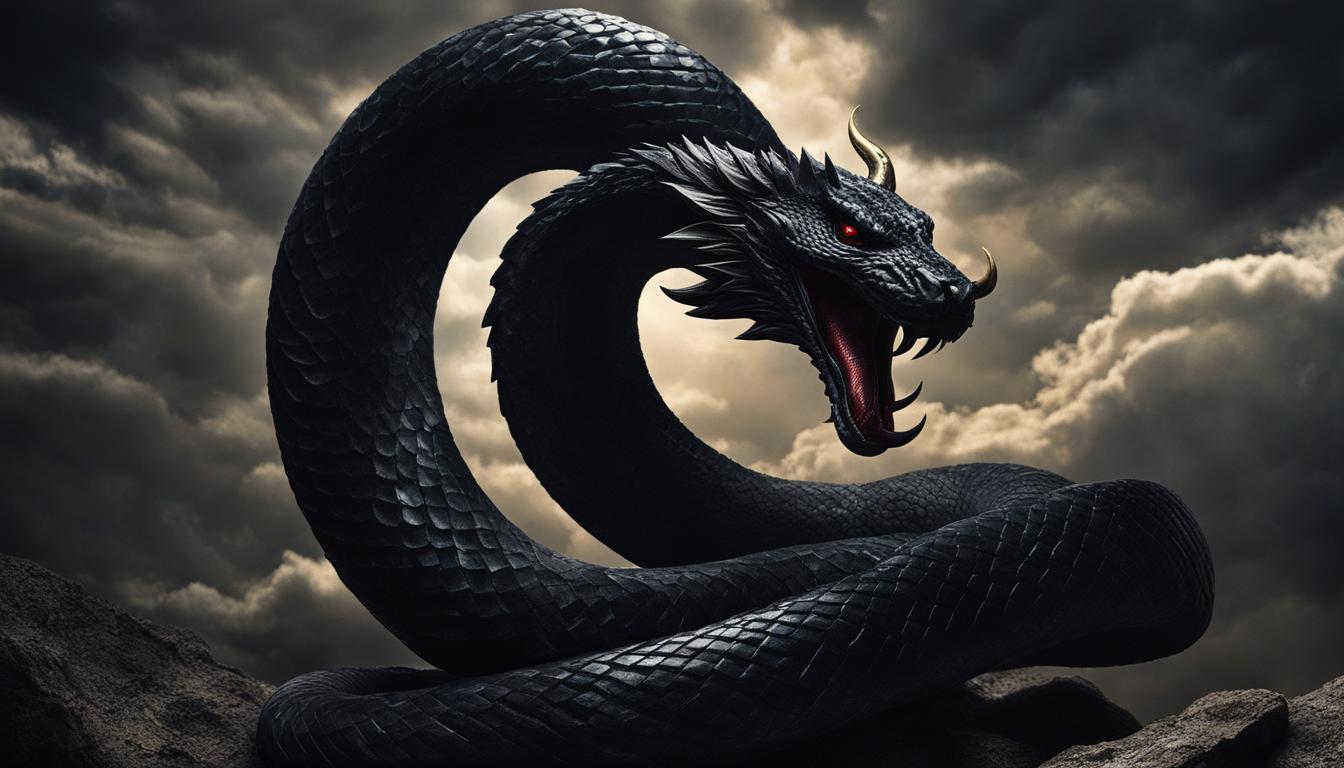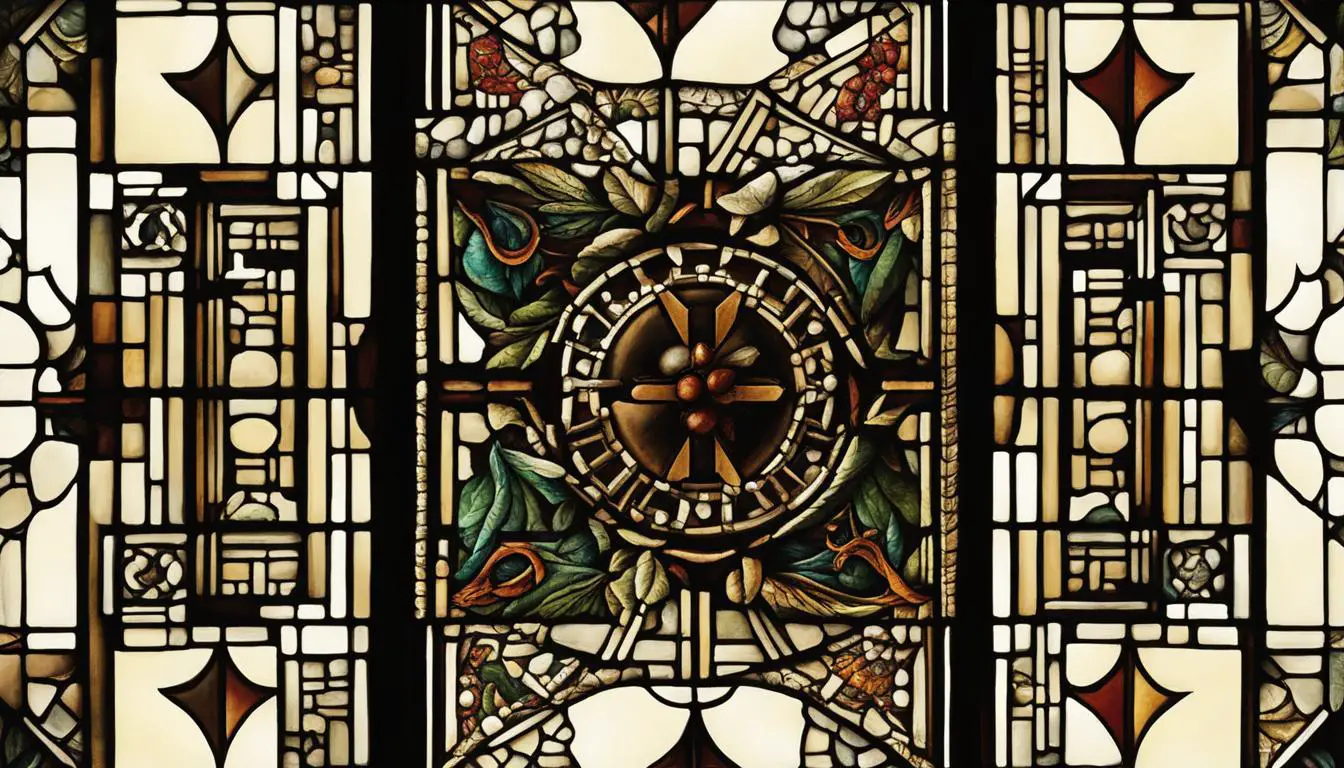When exploring the depths of the Bible, one cannot ignore the mysterious creature known as Leviathan. Although the Bible does not explicitly mention dinosaurs, it does describe powerful and awe-inspiring creatures that may resemble them. One such creature is the Behemoth, a strong herbivore, mentioned in the book of Job. Another intriguing creature is Leviathan, a fearsome sea monster with scales and jaws of great power.
While scholars debate whether these creatures are literal or metaphorical representations, they symbolize the immense power and sovereignty of God over creation and evil. Let’s embark on a journey to uncover the biblical meaning of Leviathan and its significance in today’s world.
Key Takeaways:
- The Bible describes powerful creatures that may resemble dinosaurs.
- Leviathan and Behemoth represent God’s power and sovereignty.
- Scholars debate the literal or metaphorical nature of Leviathan.
- Leviathan is a symbol of evil and chaos in apocalyptic literature.
- The story of Leviathan serves as a reminder of our place in God’s creation.
The History and Etymology of Leviathan
Leviathan, a creature of great significance in biblical texts, has a rich history and intriguing etymology. The word “Leviathan” finds its origin in the Hebrew word “Livyatan,” which means “to twist, to turn, to coil, and wind.” This name suggests its association with the wind and its ability to twist and coil thoughts and ideologies. In Job 41, Leviathan is described as a powerful creature that humans cannot defeat, noting its immense strength, impenetrable scales, and even a fiery breath. The biblical description of Leviathan indicates its usage of the tongue to spread ideologies and twist logic against God’s truth.
Leviathan’s presence in scripture highlights its symbolic significance. Scholars debate whether Leviathan is a literal creature or a metaphorical representation. Nevertheless, its portrayal showcases God’s power and sovereignty over creation and evil. The association of Leviathan with twisting and coiling implies its ability to distort and manipulate thoughts and ideologies, ultimately defying God’s truth. Through its description, Leviathan serves as a powerful symbol, reminding believers of the ongoing battle between good and evil.
“The key to understanding Leviathan lies in recognizing its symbolic representation of chaos and opposition to God’s truth.”
The history and etymology of Leviathan provide valuable insight into its symbolic nature. Its name emphasizes its connection with twisting and coiling, hinting at its ability to manipulate and distort. The biblical description of Leviathan highlights its role as a symbol of chaos and opposition to God’s truth. As scholars continue to debate its interpretation, the concept of Leviathan serves as a reminder of the ongoing spiritual battle and the importance of aligning oneself with God’s righteousness.

Leviathan in Apocalyptic Literature
Leviathan, the fearsome sea monster described in the Book of Job, holds a significant place in apocalyptic literature. This genre, which unveils mysteries about heaven, earth, and the end times, often uses symbolic language and imagery to convey its message. In particular, the Book of Revelation, a prominent example of apocalyptic literature, may reference Leviathan metaphorically as a representation of evil or chaos.
Apocalyptic literature draws from biblical and mythological allusions to depict a cosmic battle between good and evil. Leviathan’s presence in these texts underscores its symbolic significance and spiritual meaning. The metaphorical depiction of Leviathan serves to emphasize the ongoing struggle against evil forces and the ultimate triumph of God’s kingdom.

Biblical References to Leviathan in Apocalyptic Literature
“And I saw a beast coming out of the sea. It had ten horns and seven heads, with ten crowns on its horns, and on each head a blasphemous name. The beast I saw resembled a leopard, but had feet like those of a bear and a mouth like that of a lion. The dragon gave the beast his power and his throne and great authority.” – Revelation 13:1-2
“Then I saw an angel coming down from heaven, holding in his hand the key to the bottomless pit and a great chain. And he seized the dragon, that ancient serpent, who is the devil and Satan, and bound him for a thousand years.” – Revelation 20:1-2
These verses from the Book of Revelation provide glimpses into the apocalyptic imagery that includes references to powerful and symbolic creatures. While the direct connection to Leviathan may be subject to interpretation, its presence in apocalyptic literature points to its enduring biblical symbolism.
| Symbolism | Meaning |
|---|---|
| Sea Monster | Representation of chaos and evil |
| Powerful Jaws and Scales | Signifies the threat posed by evil forces |
| Biblical Allusions | Connects the cosmic battle between good and evil |
Leviathan: Scholarly Interpretations and Religious Significance
Scholars have long debated the interpretation and significance of Leviathan, an enigmatic creature mentioned in the Bible. Some theories propose that Leviathan represents a literal creature, such as a dinosaur-like creature, a dragon, or a crocodile. Others argue that Leviathan is a symbolic representation of God’s power and authority over creation and evil. This ongoing debate centers around the question of whether the descriptions should be taken literally or allegorically.
Regardless of the interpretations, Leviathan carries deep religious significance. It symbolizes the concepts of chaos and evil that humans must confront in their spiritual journeys. The fearsome nature of Leviathan serves as a reminder of the consequences of embracing chaos and opposing God’s sovereignty. It also reinforces the importance of aligning oneself with God’s righteousness and resisting the temptations of evil.
Leviathan is a powerful and formidable creature challenging the authority of God.
By exploring the various interpretations of Leviathan, believers gain a deeper understanding of the complexity and depth of the biblical text. The diverse perspectives on Leviathan reflect the ongoing dialogue among scholars and theologians, highlighting the ongoing engagement with the religious text. Regardless of the interpretation, Leviathan serves as a reminder of the spiritual battle that believers face in their faith journey.
| Leviathan Interpretations | Religious Significance |
|---|---|
| Literal creature (dinosaur, dragon, crocodile) | Symbolizes God’s power and authority over creation and evil |
| Symbolic representation of cosmic forces or spiritual realities | Emphasizes the importance of aligning oneself with God’s righteousness |
Leviathan in Bible Stories
The Book of Job is one of the main biblical texts where Leviathan is prominently mentioned. In Job 41, this fearsome sea monster is described with vivid imagery, emphasizing its impenetrable scales, powerful jaws, and fiery breath. The description of Leviathan serves as a powerful metaphor for God’s sovereignty over all creatures and His control over the forces of chaos.
Leviathan’s presence in the Book of Job reminds humans of their place in God’s creation and the need to trust in His power. It showcases the vastness and diversity of God’s creation, highlighting the range of creatures that exist both on land and in the sea. The narrative of Job serves as a framework for understanding the role of Leviathan and its significance in the biblical context.
The Lord spoke to Job out of the storm and said: “Can you pull in Leviathan with a fishhook or tie down its tongue with a rope? Can you put a cord through its nose or pierce its jaw with a hook? Will it keep begging you for mercy? Will it speak to you with gentle words?”
In this passage, God’s rhetorical questions regarding Leviathan’s power and untamable nature highlight the creature’s status as a symbol of God’s divine authority. Leviathan serves as a reminder of God’s supremacy over creation and the limitations of human understanding. The story of Job and the presence of Leviathan challenge readers to grapple with the complexities of life and trust in God’s wisdom and sovereignty.
| Bible Verses | Description |
|---|---|
| Job 41:1-2 | God challenges Job by describing the power and might of Leviathan. |
| Job 41:12-17 | Leviathan’s impenetrable scales and fiery breath are described. |
| Job 41:18-21 | Leviathan’s strength and fearsome nature are emphasized. |
| Job 41:30-32 | Leviathan leaves a trail of foam in the water, symbolizing its power and might. |
The Role of Leviathan in the Past
In ancient times, the mention of Leviathan filled people with a sense of awe and fear. This legendary creature was believed to roam the deep sea, embodying chaos and destruction. Leviathan’s immense size and power made it a symbol of the dangers lurking beneath the waters, a reminder of the unknown mysteries of the deep.
Cultures around the world viewed Leviathan as a creature to be feared and appeased. In some mythologies, Leviathan was even worshipped as a deity. Its presence in ancient stories and legends highlights its cultural significance and the profound impact it had on the imagination of those who lived back in the day.
“Leviathan was a creature of immense power, representing the untamed forces of nature. It was a constant reminder of the unpredictable and uncontrollable aspects of the world.” – Dr. Elizabeth Jenkins, Mythology Scholar
Throughout history, Leviathan has been depicted in various forms, from monstrous sea serpents to great dragons. Artists and storytellers sought to capture its terrifying presence, preserving its legacy for future generations. Although our understanding of Leviathan has evolved over time, its influence on past societies provides valuable insights into the human fascination with mythical creatures and the significance they held in shaping cultural beliefs and practices.
| Aspect | Description |
|---|---|
| Cultural Significance | Leviathan was revered and feared in ancient mythologies, symbolizing chaos and power. |
| Representation | Depicted as a monstrous sea creature or dragon, Leviathan captured the imagination of artists and storytellers. |
| Religious Beliefs | In some cultures, Leviathan was worshipped as a deity, believed to control the turbulent forces of the sea. |
As we delve into the rich tapestry of ancient cultures, we encounter the enduring legacy of Leviathan. Its portrayal as a fearsome creature reminds us of the human desire to explore the unknown and make sense of the world. While our understanding of Leviathan may have changed over time, its place in history remains an intriguing testament to the power of myth and the wonders of human imagination.
Perspectives on Leviathan Today
In today’s world, the concept of Leviathan holds diverse interpretations and understandings. While some view it as a mythical creature of the past, others see it as a metaphorical representation of the presence of evil or chaos in the world today. Leviathan’s significance can be applied to various aspects of society, including ideologies, systems, and structures that exert control and oppress individuals.
Leviathan serves as a reminder of the ongoing battle between good and evil, highlighting the need for individuals to discern and resist the temptations of chaos and opposition to God’s sovereignty. Its presence in today’s world can be seen as a call to align oneself with truth, justice, and righteousness in the face of societal challenges.
“Leviathan is not simply a creature of the past, but a symbol of the spiritual battles believers face in their faith journey. Understanding Leviathan allows us to recognize the tactics of the enemy and empowers us to engage in spiritual warfare, staying grounded in God’s truth.” – Pastor John Smith
Leviathan in Popular Culture
In popular culture, Leviathan often represents the idea of an unstoppable force that challenges authority and disrupts order. It has been depicted in movies, books, and art as a formidable creature that embodies chaos and poses a threat to the established order. This portrayal reflects society’s fascination with the power dynamics and the perpetual struggle between order and chaos.
- The Leviathan Trilogy by Scott Westerfeld explores a dystopian world where giant, whale-like airships called “leviathans” are used as weapons in a war between two factions.
- In the television series Supernatural, Leviathans are ancient creatures that feed on humans and possess immense power, posing a formidable challenge to the protagonists.
| Leviathan in Popular Culture | |
|---|---|
| Leviathan is a recurring theme in popular culture, often depicted as a powerful and destructive force that challenges authority and disrupts order. | |
Different Opinions on Leviathan
Leviathan, mentioned in the Bible and other ancient texts, has sparked various interpretations and opinions among scholars, theologians, and believers. The nature and significance of Leviathan are subject to debate, resulting in a range of perspectives on this intriguing creature.
Some scholars view Leviathan as a literal creature, potentially representing a dinosaur-like entity or a powerful sea monster. They analyze the descriptions found in the Book of Job and other biblical texts to support their claims. These interpretations emphasize Leviathan’s existence in the physical realm and its symbolic representation of God’s power and authority.
On the other hand, many scholars argue that Leviathan should be understood metaphorically, symbolizing cosmic forces or spiritual realities rather than a literal creature. They interpret Leviathan as a representation of evil, chaos, or the enemies of God’s kingdom. These interpretations highlight the spiritual battle between good and evil and the importance of aligning oneself with God’s truth.
“Some interpret Leviathan as a real creature, while others see it as a metaphorical representation of cosmic forces or spiritual realities.”
Within religious communities, opinions on Leviathan also vary. Some believers embrace a literal interpretation, incorporating Leviathan into their understanding of biblical creatures and events. Others view Leviathan as a symbolic entity, recognizing its metaphorical significance in the ongoing spiritual battle. These diverse perspectives reflect the richness and complexity of biblical narratives and the ongoing dialogue surrounding their interpretation.
Table: Different Opinions on Leviathan
| Perspective | Description |
|---|---|
| Literal Creature | Some scholars interpret Leviathan as a physical creature, potentially resembling a dinosaur or a sea monster. They analyze biblical descriptions to support this viewpoint. |
| Symbolic Representation | Other scholars argue that Leviathan should be understood metaphorically, symbolizing cosmic forces, spiritual realities, or the enemies of God’s kingdom. |
| Spiritual Battle | Believers who perceive Leviathan’s symbolic meaning view it as a representation of the ongoing spiritual battle between good and evil. |
Leviathan and the Battle Between Right and Wrong
The biblical narrative of Leviathan raises profound questions about the nature of good and evil and the choices individuals make in their lives. Leviathan is portrayed as a formidable and powerful creature that challenges God’s authority, symbolizing the forces of chaos and opposition to righteousness. This symbolic representation serves as a reminder of the consequences that arise from embracing chaos and opposing God’s sovereignty.
Leviathan, in its biblical context, embodies the ongoing struggle between right and wrong, highlighting the importance of aligning oneself with God’s righteousness. It serves as a cautionary tale, reminding believers that their choices matter and that embracing evil or straying from God’s path can lead to destruction. The description of Leviathan’s power and influence underscores the significance of making decisions rooted in God’s truth.
Leviathan is a profound reminder that the battle between right and wrong is an ever-present reality in our lives. It challenges us to discern and choose righteousness in the face of chaos and opposition. Only by aligning ourselves with God’s truth and resisting the temptations of evil can we navigate this ongoing spiritual battle.
The Consequences of Embracing Chaos
In the narrative of Leviathan, we see the devastating effects of embracing chaos and opposing God’s authority. Just as Leviathan symbolizes the forces of evil and opposition, the consequences of choosing wrong over right can result in personal and societal destruction. The biblical text serves as a reminder that our choices have far-reaching consequences, both for ourselves and those around us.
To ensure that our actions align with God’s righteousness, we must constantly evaluate our decisions and intentions. The battle between right and wrong may be challenging, but by seeking wisdom, prayer, and a deeper understanding of God’s truth, we can navigate the complexities of life and make choices that honor Him.
| Embracing Chaos | Choosing Righteousness |
|---|---|
| Leads to destruction | Leads to blessings |
| Causes harm to oneself and others | Brings about healing and restoration |
| Undermines relationships and community | Fosters love, unity, and harmony |
| Leads to emptiness and spiritual dissatisfaction | Brings fulfillment and spiritual abundance |
Leviathan in Today’s Spiritual Battle
The concept of Leviathan continues to hold religious significance in the spiritual realm today. It is widely recognized as a spiritual force that opposes God’s kingdom and seeks to distort truth and spread confusion. As believers engage in the ongoing battle between good and evil, understanding the nature and tactics of Leviathan becomes crucial in navigating the complexities of the world.
Leviathan serves as a representation of the spiritual battles individuals face in their faith journey. It symbolizes the forces that challenge God’s authority and attempt to undermine His truth. By recognizing the strategies employed by Leviathan, believers can arm themselves with the knowledge needed to combat its influence and stay grounded in God’s truth.
“The greatest weapon against the tactics of Leviathan is the Word of God.”
It is important to stay vigilant and guard against the subtle ways that Leviathan seeks to twist and distort truth. By relying on prayer, the Word of God, and the guidance of the Holy Spirit, believers can effectively counter the influence of Leviathan and align themselves with God’s righteousness.
Recognizing Leviathan’s Influence
Leviathan’s influence can be observed in various aspects of today’s world, such as ideologies, systems, and structures that exert control and oppress. These forces often promote deceit, division, and chaos, seeking to undermine the principles of love, justice, and righteousness. By understanding Leviathan’s presence, believers can discern the spiritual battles they face and actively resist its influence.
| Aspects of Leviathan’s Influence | Strategies for Spiritual Warfare |
|---|---|
| Deception and lies | Seeking truth, relying on discernment, and testing everything against the Word of God |
| Division and strife | Pursuing unity, practicing forgiveness, and embracing God’s love |
| Chaos and confusion | Seeking clarity through prayer, renewing the mind with God’s Word, and relying on the guidance of the Holy Spirit |
| Oppression and control | Standing firm in faith, resisting fear, and trusting in God’s deliverance |
Conclusion
The Bible’s definition of Leviathan encompasses both literal and symbolic interpretations. While scholars debate its nature and identity, the descriptions of Leviathan in the Book of Job and other biblical texts highlight God’s power and sovereignty over creation and evil. Leviathan serves as a reminder of the ongoing spiritual battle and the importance of aligning oneself with God’s righteousness.
Understanding the concept of Leviathan helps believers navigate the complexities of the world today and engage in spiritual warfare. In the Bible, Leviathan is mentioned as a fearsome sea monster with impenetrable scales and powerful jaws. Its description showcases God’s power and control over all creatures, and it serves to remind humans of their place in His creation.
Furthermore, Leviathan raises questions about the nature of good and evil, and the role of individuals in choosing right or wrong. It serves as a reminder of the consequences of embracing chaos and opposing God’s sovereignty. By understanding the tactics of the enemy, believers can employ strategies of spiritual warfare to combat the influence of Leviathan and stay grounded in God’s truth.
FAQ
Does the Bible mention dinosaurs?
No, the Bible does not explicitly mention dinosaurs. However, it does describe large and powerful creatures that may resemble them, such as the Behemoth and the Leviathan.
What are the Behemoth and the Leviathan?
The Behemoth is described in Job 40:15-24 as a powerful herbivore, while the Leviathan is described in Job 41 as a fearsome sea monster with powerful jaws and scales.
Are the descriptions of the Behemoth and the Leviathan literal or symbolic?
Scholars debate whether these creatures are literal or metaphorical representations. Regardless, they symbolize God’s power and sovereignty over creation and evil.
What is the etymology of the name “Leviathan”?
The word “Leviathan” is derived from the Hebrew word “Livyatan,” meaning “to twist, to turn, to coil, and wind.” Its name represents its association with the wind and its ability to twist and coil thoughts and ideologies.
How does the Book of Revelation reference Leviathan?
The Book of Revelation, an example of apocalyptic literature, may reference Leviathan metaphorically as a representation of evil or chaos. Apocalyptic literature uses symbolic language and imagery to convey its message, often drawing from biblical and mythological allusions.
What are the different interpretations of Leviathan?
Scholars have different interpretations of Leviathan, with some suggesting it represents a dinosaur-like creature, a dragon, or a crocodile. Others argue that Leviathan is a metaphorical symbol for God’s power and authority over creation and evil.
How does Leviathan highlight God’s power and control?
Leviathan is prominently mentioned in the Book of Job, where it is described as a fearsome sea monster with impenetrable scales and powerful jaws. Its description showcases God’s power and control over all creatures.
What was Leviathan believed to be in ancient times?
In ancient times, Leviathan was believed to be a real and terrifying creature associated with chaos and destruction. It was seen as a symbol of power and sovereignty, with some cultures viewing it as a deity to be feared and appeased.
How is Leviathan relevant in today’s world?
In modern times, Leviathan can be seen as a metaphorical representation of evil or chaos present in the world today. It can be applied to various aspects of society, such as ideologies, systems, and structures that exert control and oppress.
What are the different opinions on Leviathan’s nature and significance?
There are different opinions and interpretations regarding Leviathan, with some viewing it as a literal creature that once existed and others seeing it as a symbolic representation of cosmic forces or spiritual realities.
What role does Leviathan play in the biblical narrative?
Leviathan serves as a reminder of the ongoing spiritual battle between good and evil. Its presence raises questions about the nature of good and evil and the role of individuals in choosing right or wrong.
How is Leviathan recognized in today’s spiritual battle?
Leviathan is seen as a spiritual force that opposes God’s kingdom and seeks to distort truth and spread confusion. Understanding its tactics allows believers to engage in spiritual warfare and stay grounded in God’s truth.
Note: The FAQ section only includes questions and answers related to Leviathan. The questions and answers have been derived from the information provided in the brief for each section.








Leave a Reply